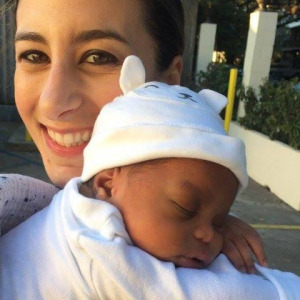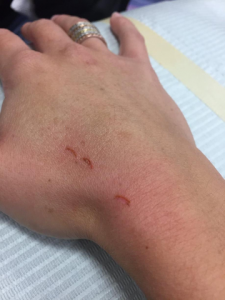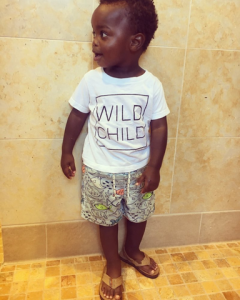Just over four years ago, Jessica Pakzad Bennett flew from California to New Orleans; when she flew back, she returned with a son. Not only was Jessica suddenly a mother, but she was a White mother with a Black son. She knew the road ahead wouldn’t be easy for her and Amari, but she’s met all these challenges with incredible wisdom and unwavering strength.
I was able to sit down with Jessica and talk about the whole process — the adoption process, raising Amari as a White woman, and the challenges and joys of her experience. Read our full interview below!


Q: What were your reasons for choosing adoption?
A: I’m exceptionally unusual in why I chose adoption — my first memory of knowing I was going to adopt was when I was 16 and dating my ex husband. I had this vision of me and a Black son driving down a road. I told my boyfriend at the time that I really really wanted to adopt — first of all, I hate anything medical. The thought of going through childbirth was horrific to me. And I felt like there’s so many kids in the world — not only from an overpopulation perspective, but from a needs-based perspective, why would I need to add to that?
When Amari was born, I posted all about it on my Facebook page. One of my childhood friends messaged me and said, “You told me you were going to do this when you were 9.” I said, “What?” She said, “Yeah, we were playing house and you said ‘I’m going to adopt because there are so many babies that need mommies and daddies.’” So I guess it’s been a long time coming! I always had this innate sense that my child was out there — I just knew that he or she wouldn’t come from me.

Q: How did you find the birth family?
A: Through an agency. There are a million different ways to adopt. We went with the safest, semi-easiest way to do it — domestic, private, and through an agency. My ex is a very risk-averse person, so this was the way I could get him to agree to do it. International adoption is super expensive and very bureaucratic and difficult. I thought, why the hell would I go outside our country when there’s so many children in our own backyard?
Q: Did you specifically look to adopt from a different ethnicity or were you open?
A: We were open. When all the BLM stuff was happening over the summer I spoke at a march in Newport Beach as the mom of a Black kid. I talked about how racism starts even before birth — if you’re a White family open to having a Black kid, you’re pretty much guaranteed to get a Black child because so many White families only want White kids. Even if it’s not racist, it’s out of fear of not wanting to raise a Black child, the danger a Black child could be in, etc. But I believe love will always trump everything else.
Q: What was the adoption process like?
A: Everything is out of your control in the adoption process. Once you sign on the dotted line, it’s all up to the birth mothers picking you and the agency doing their due diligence and running all the reports on you. For Type A people like myself, I was going crazy. The birth mom picks the parents, not the other way around.
Amari’s birth mom picked us really early in her pregnancy. She was just entering her third trimester. By that point we were so skeptical because we’d had four previous opportunities not work out — we told the agency we weren’t paying another dime until we got on a plane to meet her. They very begrudgingly agreed, probably only because it was the fifth baby by that point. So we got plane tickets, went to New Orleans, and took Amari’s birth mom and her cousin to dinner, got beignets — it was very much like a date. At first I was so scared when I met her. She’s a southern queen! We kept contact over the next three months and then went back before she was induced, and got an Airbnb, since we’d have to keep Amari in New Orleans for two weeks per state law.
Amari’s birth mom didn’t tell anybody except her cousin she was giving him up for adoption. He was her fourth child, and we were her family at that point. We picked her up at 3am, drove her to the hospital, and were with her in the room right up through Amari’s birth. It was really amazing.
In Louisiana, the birth mom legally cannot sign her rights to the child away for 48 hours. After she gave birth, she let us take Amari to our room and he stayed there for the whole 48 hours. After those two days, the social workers and lawyers come in to counsel her and make sure she still wanted to do it. She felt kind of crappy as the birth mom — she didn’t like that they kept asking her if she really wanted to give him up for adoption. She told us after that she just wanted to be with us during that whole day. Those were the hardest two days of my life, because she could have changed her mind until the very end.
We all left the hospital together — she helped Amari into his carseat and we went back to the Airbnb. Two days later, she and I went and got tattoos together! She had dug her nails so hard into my arm when she was giving birth that it broke skin, and I wanted to get the marks of her nails tattooed on me. So we went and got tattoos — she got a pregnancy symbol with Amari’s name and birthday, and I got her nail marks on my hand. That also gave the two of us more time to talk as moms and get to know each other.


Q: You have a good relationship with Amari’s birth mom — what does that look like? How do you think that’s been beneficial to you, Amari, and his birth family? Has it been challenging at all?
A: The only challenge so far has been that there have been times she’s gone silent on us. That really broke my heart at the beginning. One Mother’s Day she didn’t answer us and that was heartbreaking. She’s back in our lives now, and the beauty of our relationship is that we can text each other any time and the other person replies immediately. We FaceTime her on Amari’s birthday and holidays. Amari knows who she is.
This is why an open adoption was nonnegotiable for me — there have been a gajillion studies that show that children who don’t look like their parents need to know why, so as a parent in an transracial adoption, I knew I needed to have an open adoption so we could always have avenues for Amari to ask questions about his biological family and his genetics. There are all of these essential things you take for granted if you’re the bio parents — if you don’t have certain knowledge, it affects you. So that’s been such a huge plus of our relationship. When I got divorced, I was so scared to tell her — she was the only person I was scared to tell! But my ex husband and I are very good friends and coparents, and Amari spends time with both of us, so I knew it would be okay.
Q: How has having a Black son impacted your views of social justice, your involvement in social justice movements, BLM, etc?
A: It’s so personal to me — my world is a Black boy! As soon as I knew we would have a Black kid, I’ve been petrified. Especially because we live in Newport Beach, and there are almost no other Black people here. For the last 5 years I’ve had to educate myself on it, and I’ve had to learn that I would never be able to adequately raise Amari without other Black adults.
It’s always a sucker punch to the gut when I hear of a Black death. It hurts more now because it’s not someone else’s problem — it’s my problem. I genuinely worry about my son being killed by cops, or bigots, or White people. And now you add on his new obsession with dresses, nail polish, all that stuff. I know a lot of boys don’t “grow out” of that. Right now I keep my mind open to whatever he wants to be when he grows up. But when I add those possibilities on top of him being Black, I get waves of anxiety.
Kids are hard to raise no matter what. I just get scared about the bigots, the police, all of that. When he was a baby, I told my Black girlfriend that I wanted to drive Amari around to all the police stations and show him to them — to say, he’s my Black son, please, don’t shoot him. I wanted to stick flyers up around the neighborhood saying “This is your neighbor, be kind to him.”

Q: As Amari gets older, how will you approach conversations about safety at traffic stops or people coming at him from a racist standpoint? Do you have a plan for these conversations?
A: I know we’ll be starting to talk about that soon — he’s already four. We already say “your beautiful brown skin” and we point out other beautiful brown skinned people we see when we’re out. So we’ve established his racial identity and soon we’re going to need to build on that. My plan is to be really honest with him. I’ll tell him that there will be people who won’t like him because of his skin color. I’m already on his ass about not playing with any toy guns. I have him keep his hands out of his pockets and not wear hoodies. And soon I’ll have to teach him why.
Q: How will you teach Amari about the socioeconomic differences between him and his biological siblings as he becomes more aware of those differences?
A: I just know I’m going to do it and talk about it in the most honest way possible. I just need to explain the facts — his bio mom loves him very much but she didn’t feel like she could take care of you as a mommy, so she chose us to be your mommy and daddy. Going to visit them might also be a very interesting way to open up conversations. Their socioeconomic status is much less worrying to me than him asking, “why didn’t she keep me?”
Also more worrying to me than socioeconomic is culture. How will he learn his culture? It won’t be the same as if he had a Black parent. He’ll need to be exposed to Black culture. We already do that with food, books, movies, television, music, and Black friends. When Black people see each other, they nod to each other, so I’m already teaching him to do that. I won’t know how to empathize with racial issues, so I’ll need surrogates to help him.
Q: What advice would you give to someone considering adoption/adopting transracially, and what do you wish you’d known/wish someone had told you?
A: Read, read, read! Watch every documentary, listen to every podcast, read every blog and website. Even Pinterest was a huge resource. Educate yourself first, before you do anything else.
It will cost more money than they tell you it will. Adoption is a business. I wish someone had told me that nobody in the adoption world — lawyer, agency, social worker, birth mom, hospital — gives a crap about you as the adoptive parents. They just want your money and for you to shut up and stop asking so many questions. It’s a for-profit business, so they’re going to tell you it costs less than what it actually costs. And I thought, I’m paying out the ass for this, they’re going to care and guide me and be my advocates. Nope. They will give you a baby, they’ll be pretty quick about it, but don’t expect them to be on your side. You have to be your own advocate.
Find other moms who have gone through the same thing — the same exact adoption process. If you want to adopt from China, find another White mom who’s adopted from China and ask questions. I did lots of phone dates with White women who adopted Black children, who I’d never even met before. And the best advice I got hands down was from those other moms who have been through this.
The last piece of advice — one woman told me to get on a plane, and go suss it out yourself, and get on the plane home. I think that was the make it or break it situation. Imagine you’re giving up a child to a stranger you’ve never met. We really built trust in that first visit and got to know each other. You wouldn’t get married over the phone or an email — so you’ve got to get on a plane and go.

Have you adopted or are you considering adopting? Did any of Jessica’s story resonate with you? Let us know in the comments!

About Jessica Pakzad Bennett
Jessica was born, raised, lives, and breathes: furniture, interior design, and family business. Passionate about entrepreneurship, women who kick ass, running a business from A to Z, and anything that embodies impeccable taste. She’s a Southern California girl to the core, borderline dog hoarder, and mom to one delicious little dude!
You can find Jessica on Instagram at: @mspakzadbennett
For More Inspirational Stories, You Should Read:
Ableism, Accessibility, And The Journey Of A Brave Woman – Our Interview With Marcela Marañon
Celebrities Are Sharing Their Miscarriage Stories — Here’s Why It Matters


Beautiful story! thank you for sharing your experiences and for taking on motherhood in this fantastic way. He’s the cutest!!!